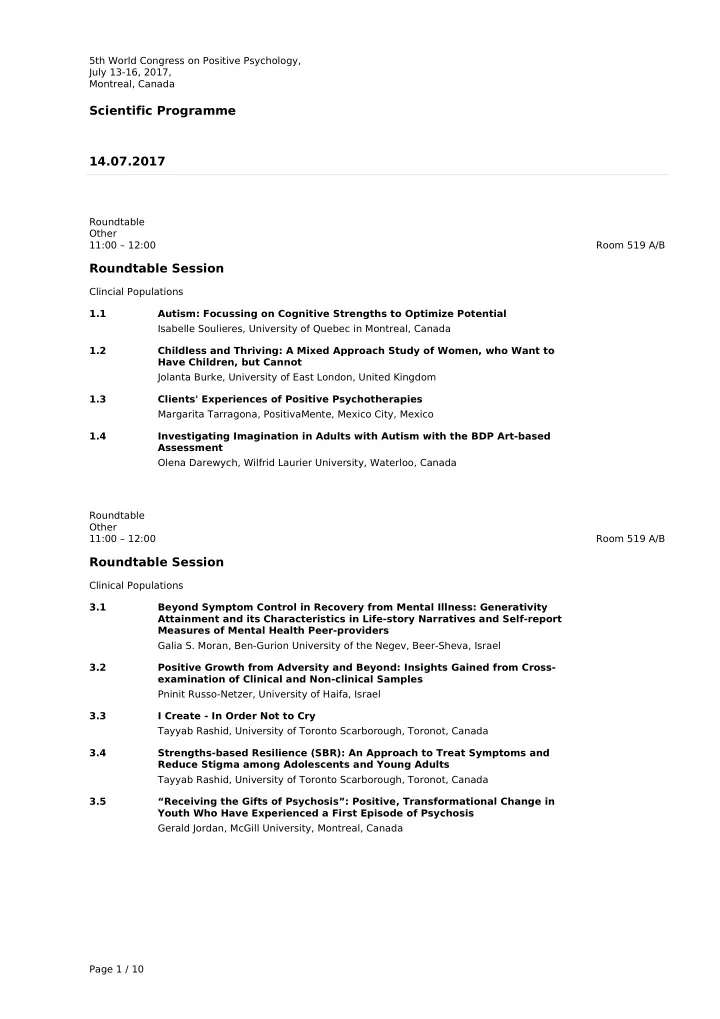

5th World Congress on Positive Psychology, July 13-16, 2017, Montreal, Canada Scientific Programme 14.07.2017 Roundtable Other 11:00 – 12:00 Room 519 A/B Roundtable Session Clincial Populations 1.1 Autism: Focussing on Cognitive Strengths to Optimize Potential Isabelle Soulieres, University of Quebec in Montreal, Canada 1.2 Childless and Thriving: A Mixed Approach Study of Women, who Want to Have Children, but Cannot Jolanta Burke, University of East London, United Kingdom 1.3 Clients' Experiences of Positive Psychotherapies Margarita Tarragona, PositivaMente, Mexico City, Mexico 1.4 Investigating Imagination in Adults with Autism with the BDP Art-based Assessment Olena Darewych, Wilfrid Laurier University, Waterloo, Canada Roundtable Other 11:00 – 12:00 Room 519 A/B Roundtable Session Clinical Populations 3.1 Beyond Symptom Control in Recovery from Mental Illness: Generativity Attainment and its Characteristics in Life-story Narratives and Self-report Measures of Mental Health Peer-providers Galia S. Moran, Ben-Gurion University of the Negev, Beer-Sheva, Israel 3.2 Positive Growth from Adversity and Beyond: Insights Gained from Cross- examination of Clinical and Non-clinical Samples Pninit Russo-Netzer, University of Haifa, Israel 3.3 I Create - In Order Not to Cry Tayyab Rashid, University of Toronto Scarborough, Toronot, Canada 3.4 Strengths-based Resilience (SBR): An Approach to Treat Symptoms and Reduce Stigma among Adolescents and Young Adults Tayyab Rashid, University of Toronto Scarborough, Toronot, Canada 3.5 “Receiving the Gifts of Psychosis”: Positive, Transformational Change in Youth Who Have Experienced a First Episode of Psychosis Gerald Jordan, McGill University, Montreal, Canada Page 1 / 10
5th World Congress on Positive Psychology, July 13-16, 2017, Montreal, Canada Scientific Programme Symposia Clinical Populations 13:30 – 14:30 Room 520 D/E/F Living Well with Less Chronic Pain: Shifting the Lens from Pathology to Resilience Chronic pain poses a tremendous public health burden, often resulting in poor mental health, lower quality of life, and functional disability. Managing pain represents a significant challenge as traditional interventions such as medication and behavioral therapies are only modestly effective for improving pain outcomes. Given this, efforts to improve pain management are of critical importance. While research has traditionally focused on factors that are associated with vulnerability, pathology, and the maintenance of chronic pain, recent evidence suggests that resilience and positive affect activation play an important role in reducing pain and improving adaptive coping skills. Hence, capitalizing on positive resources and strategies is a promising target for optimizing pain management. This symposium will present new data highlighting the importance of resilience in reducing the burden of chronic pain, and will provide evidence supporting the clinical utility of resilience-oriented interventions targeting positive affect activation in pain treatment. Dr. Sibille will present data identifying factors associated with resilience and lower biological burden in individuals with chronic pain and discuss strategies to enhance neuroplasticity and positive affect activation in the treatment of chronic pain. Dr. Bartley will review data from four studies reporting on putative biological and psychosocial mechanisms by which positive affect confers adaptive pain functioning, and will also highlight results from a recent randomized clinical trial assessing the efficacy of a hope intervention for persistent orofacial pain. Dr. Hassett will report findings related to predicting resilience in chronic pain and from three clinical trials exploring the efficacy of a positive activity intervention targeting psychological well-being and pain-associated outcomes. The contribution of these findings in terms of future directions for pain management will be discussed. Chair: Kimberly Sibille, University of Florida, Gainesville, United States Harnessing the Power of Resilience: Mechanisms and Approaches that Promote Adaptive Functioning in Chronic Pain Emily Bartley, University of Florida, Gainesville, United States Stepping Off the Beaten Path of Chronic Pain Treatments and Exploring Alternative Targets Kimberly Sibille, University of Florida, Gainesville, United States Positive Affect as a Predictor of Outcome and a Target for Intervention in Chronic Pain Afton Hassett, University of Michigan Medical School, Ann Arbor, United States Page 2 / 10
5th World Congress on Positive Psychology, July 13-16, 2017, Montreal, Canada Scientific Programme 15.07.2017 Clinical Populations 07:00 – 08:00 Room 520 D/E/F Positive Clinical Psychology Division Business Meeting Individual Podium Presentations Clinical Populations 09:45 – 10:45 Room 520 A/B/C Avant-garde Positive Psychology Interventions *Organized by IPPA's Positive Clincal Psychology Division* The International Positive Psychology Association's Positive Clinical Psychology Division presents the finalists in their 2017 Avant-garde Positive Psychology Clinical Interventions Challenge. In a series of individual podium talks, finalists will describe their fresh, innovative clinical intervention to foster mental health and wellbeing as well as alleviate psychological stress and dysfunction. The purpose of the competition is to increase knowledge about important considerations when building a Positive Psychology Intervention, contribute to best practices and standards for interventions, and harness the potential to launch research projects within the field of clinical positive psychology. Everyone is invited to come cheer on the finalists and contribute to the conversation. Chair: Tayyab Rashid, University of Toronto Scarborough, Toronot, Canada Page 3 / 10
Recommend
More recommend